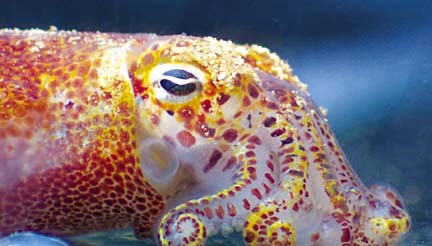
COURTESY BBC NATURAL HISTORY UNIT
The Hawaiian bobtail squid fools predators waiting below by disguising its night shadow, according to UH researchers.
Squid uses own light
to mimic moonbeams
University of Hawaii researchers have discovered how a Hawaiian squid camouflages itself by glowing in the dark.
Researchers have known about the Hawaiian bobtail squid's luminescent properties but have not been able to figure out how it is able to direct its light.
"It's kind of like a flashlight," said Wendy Crookes, a researcher in Margaret J. McFall-Ngai's lab at the Kewalo Marine Laboratory.
While other luminous sea creatures are also known, the reflective plates on the Hawaiian bobtail squid differ from those of other animals.
The light itself is provided by colonies of luminescent bacteria that live on the squids, the researchers report in the Jan. 9 issue of the journal Science.
"Light organs are not uncommon in nature," observed Crookes, first author of the paper. "In this one the light organ does have a lens similar to an eye in some respects, but we don't really know its capabilities in terms of specifically directing light."
"The light is subtle but it's there," she added. "We think it's a counter-predatory camouflage."
The 2- to 3-inch squids forage and mate at night, and predators that eat them tend to hide in the sand, looking upward.
"We think it projects light down, and that looks like moonlight so the squid doesn't cast a shadow and is not silhouetted against the night sky," Crookes said.
The plates that reflect and seem to focus the light differ from reflective plates found in other animals, the researchers said.
While reflective plates in many aquatic species are formed from chemicals called purines, in this squid they are made from an unusual type of protein the researchers named reflectin.
The chemical composition of that tissue is unusual, agreed Michael Vecchione, director of the National Systematics Laboratory of the National Marine Fisheries Service.
Crookes said the research team is now studying the relationship between the squids and the bacteria that produce the light. The bacteria and squids have a mutually beneficial relationship, Crookes said. Such relationships are common in nature, including beneficial bacteria in the human gut, she noted.
